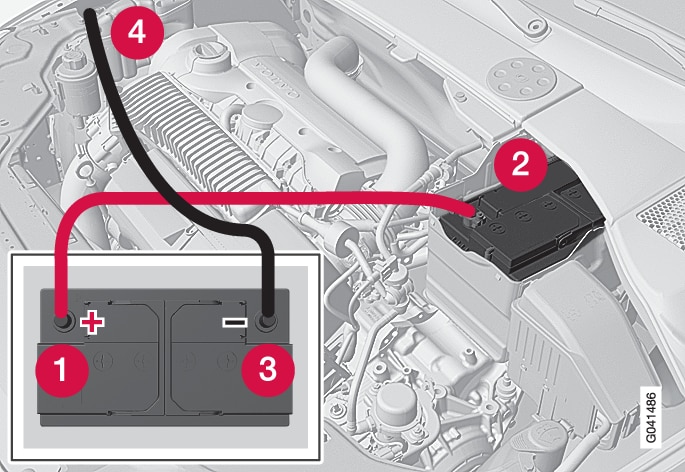
When jump starting the car, the following steps are recommended to avoid short circuits or other damage:
Set the car's electrical system in key position 0, see Key positions - functions at different levels.
Check that the donor battery has a voltage of 12 V.
If the donor battery is installed in another car - switch off the donor car's engine and make sure that the two cars do not touch each other.
Connect one of the red jump lead's clamps to the donor battery's positive terminal (1).
Important
Connect the start cable carefully to avoid short circuits with other components in the engine compartment.
Open the clips on the front cover of the battery in your car and remove the cover, see Starter battery - replacement.
Connect the red jump lead's other clamp onto the car's positive terminal (2).
Connect one of the black jump lead's clamps to the donor battery's negative terminal (3).
Connect the other clamp to a grounding point, e.g. right-hand engine mounting at the top, the outer screw head (4).
Check that the jump lead clamps are affixed securely so that there are no sparks during the starting procedure.
Start the engine of the "donor car" and allow it to run a few minutes at a speed slightly higher than idle approx. 1500 rpm.
Start the engine in the car with the discharged battery.
Important
Do not touch the crocodile clips during the start procedure. There is a risk of sparks forming.
Remove the jump leads in reverse order - first the black and then the red.
Make sure that none of the black jump lead's clamps comes into contact with the battery's positive terminal or the clamp connected to the red jump lead!
Warning
- The battery can generate oxyhydrogen gas, which is highly explosive. A spark can be formed if a jump lead is connected incorrectly, and this can be enough for the battery to explode.
- The battery contains sulphuric acid, which can cause serious burns.
- If sulphuric acid comes into contact with eyes, skin or clothing, flush with large quantities of water. If acid splashes into the eyes - seek medical attention immediately.